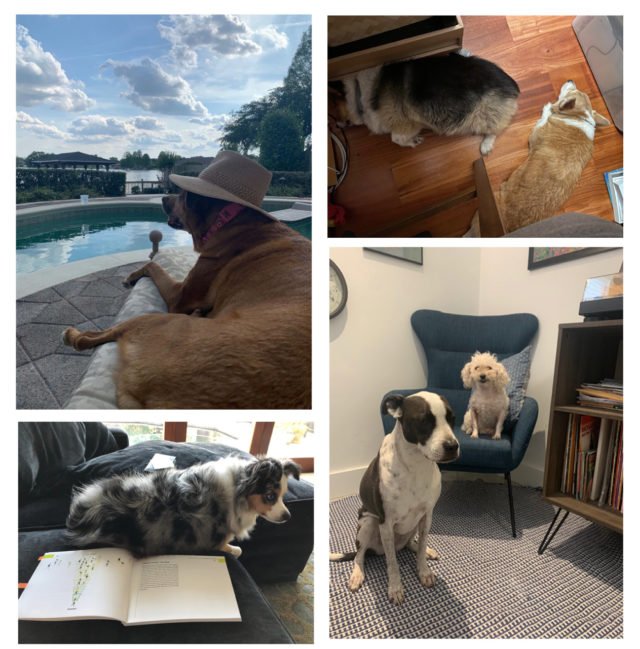1. Tell us about your role at InFront Compliance?
I am co-founder and the chief technical officer of InFront Compliance. I am also the head of product. In a small business, roles are always broad and we tend to wear a lot of ‘hats’. My primary responsibility is anything technical. I oversee development and enhancement of our software platform and web presence, technical and customer support, and onboarding. I also have support duties related to sales, assessment content development, and partner initiatives. It’s a busy, but exciting, time!
2. Can you tell us about your journey into this market?
My journey to where we are now started 25 years ago, when I first began learning to code. From there, I was a developer for a number of B2B startups. After leaving my job as a software engineer, I went back to school and became an attorney. From there, I spent ten years helping my clients with data privacy, technology, and corporate issues. My co-founder is also an attorney, and we noticed, particularly in recent years, that it was getting harder and harder for our clients to close contracts where data sharing was key to the deal. We saw a lot of compliance-related transactional friction in highly regulated industries such as financial services, which we subsequently decided to pursue as our first industry vertical — we felt this was somewhere we could make a large impact. We were then invited to apply for the Barclays Accelerator powered by Techstars. Participation in this initiative gave us additional insight into the financial services and fintech industries.
3. How do you think technology is upgrading the financial sector?
The financial sector is interesting because certain parts of it are trying to evolve as fast as possible to take advantage of the capabilities that are quickly emerging in artificial intelligence and data analytics. But other areas of the same institutions are slower to adapt, particularly in the back-office processes, where tried and surmised true seems to hold sway. I think part of this is the demographic of individuals in these sectors; they are generally more risk-averse when it comes to adapting new technology. Part of it is that the cost-benefit of adapting certain back-office efficiencies isn’t always as visible, and is thus less enticing for wooing consumers. Mobile deposit will always be more interesting to consumers than an iron-clad compliance process for making sure that data is captured efficiently and used responsibly. We’ve seen this change as third-party vendors have been increasingly responsible for large and costly data breaches, but it’s still a process to get buy-in for these initiatives.
4. How has digitization helped in better Compliance Management?
Digitization in compliance is a huge opportunity. Over 80% of financial institutions are still managing third party compliance using spreadsheets, even as they have begun to adopt governance and risk software platforms. To us, this doesn’t actually improve the compliance process, because these tools, while digital, still leave a lot of room for human error. A spreadsheet mailed around can be edited. Macros can be broken, ruining formulas. Version control is an issue, and identifying the source of the responses is also problematic. All of that doesn’t even touch on ongoing monitoring, and how difficult it is to ensure continuing compliance across organizations. We think there’s an opportunity to reduce this manual error and make compliance a collaborative process that’s transparent across all of the relevant stakeholders and efficient to arrive at decisions quickly and monitor relationships to reduce risk. That’s why we stepped up to build our platform, which is part expert system, part workflow management, and part collaboration tool.
5. Can you explain how RegTech is easing compliance and risk management?
A lot of companies want to solve the compliance and risk management roadblocks faced by financial institutions. Regulations exist to reduce the cost of doing business. The government regulates industries so that everyone is on the same page and can conduct business safely and efficiently. Compliance is supposed to be there for us, as users of the financial system. However, the underlying goals of regulations often get lost in the shuffle of compliance. As regulations become more complex and evolve quickly, this safety net becomes its own set of transaction costs and headaches. Implementing a RegTech solution can try to reduce these additional costs and headaches, and return the regulations and compliance with them toward the original goals of creating a safer environment for businesses to conduct businesses and users to engage with the financial sector. This seems more philosophical than technical, but you have to start with understanding the goals of the system before you can solve the problems that are keeping the goals from being met.
6. We recently covered the news about the launch of Next-Gen Vendor Risk Management Platform; can you elaborate more on the new platform?
We are very excited to have launched our platform. It’s been years of work in the making. My co-founder and I really wanted to build a system that delivers regulatory expertise to any stakeholder that might need it in an easy-to-use, understandable, and beautiful way. Our platform is an online assessment and reporting tool that helps any organization, whether financial institution, enterprise, or SMB, to manage their third-party and internal risk. Our platform takes regulatory frameworks— whether it’s GLBA, UDAAP, or even GDPR or NY State Department of Financial Services Cybersecurity Regulations—and breaks them down into a dynamic series of questions and answers. Users can subsequently respond to plain-language questions and evaluate their compliance posture against whichever of these frameworks apply to them. Financial institutions that use the platform can send assessments directly to vendors and receive back easy-to-use reports of their vendor’s compliance, as well as details as to when, who, and what each response entailed. With updating and monitoring built-in, our system makes staying compliant just as easy as getting compliant.
7. What features of your risk management platform differentiates it in the market?
We have a couple of differentiators built into our system.
1. The platform was designed by people who understand the problem and lived it daily. As attorneys, we have extensive experience in helping clients figure out their compliance obligations and what needed to happen to close deals— we bring this expertise directly into our software platform, making it a true expert system rather than just a technology shell. In short: We are not an online spreadsheet; we are an expert system.
2. We understand that compliance doesn’t happen in a vacuum. We coined the term Collaborative Compliance, because in this age of technology sharing and data sharing, no organization truly engages in compliance individually. It’s an ecosystem, so we built collaboration into the platform and designed it to help individuals share information transparently, thus reducing the time to close gaps between parties.
8. What advice would you like to give to the technology Start Ups?
Take every bit of feedback you get with a smile. A lot of it will be very helpful. Some of it won’t, and you will have to be the one to decide what makes sense to your business. You’ll likely have to pivot, but don’t be afraid to understand your business model and stick to your values and goals.
Chasing every opportunity is good, but each opportunity has a cost and a benefit, and you have to weigh those costs against your long-term goals and whether the opportunity fits into your business or not.
If it doesn’t, it better be worth the transformation that is likely to come about by engaging. Agility is important, but you have to be agile while understanding your goals and what you want your business to accomplish in the long-term. Good luck!
9. What is the Digital innovation in sales technology according to you that will mark 2020?
Unfortunately, I think every aspect of life in 2020 will be marked by COVID-19. A lot of innovation that comes from this year will be around engaging with customers, with partners, and with employees remotely. How will we be able to remain efficient, productive, and most importantly thrive while we keep ourselves and our families and communities safe? We are lucky that our technology platform enables these remote relationships to flourish, but we’ve had to adapt our sales techniques to embrace this new reality as well. In-person conferences are out; virtual conferences and LinkedIn relationships are in. I think the virtual conference and event space is going to blow up over the next few years: people will find new ways to engage each other virtually in sales initiatives, and that will require new technology.
10. How do you prepare for an AI-Centric world?
The way we see it, there are two answers to this question.
1. From a compliance standpoint, we need to be prepared to understand the new flavors of regulations that have and will come into play as AI expands. As data mining and linking becomes part of our daily life, new privacy rules will spring up to determine how this data is stored, used, transmitted, and sold. I think companies will have to build their systems with these considerations in mind. It’s cheaper to build it safe and secure from the beginning, rather than to retrofit an existing model.
2. From a practical standpoint, we are going to have to take the time to understand what can and can’t be accomplished with our current AI technology. Training AI is still an evolving area, and certain aspects, like augmented reality are leaping ahead while others —like contract interpretation and natural language machine learning— are going to take longer and be more manual. So, every company needs to really think about how they can realistically use AI to make their business more efficient rather than just adopt it for the sake of buzzwords.
11. What are the major developments you are planning, in recent time?
We are planning some great features for the next version of our platform. We are working on harmonizing across multiple assessment frameworks, reducing the number of questions users have to answer to understand compliance with multiple regulations. We are also mapping out enhanced collaboration, which will allow more give and take through the entire process, including collaboration in the report review and post-relationship action items.
12. Can you tell us about your team and how it supports you?
We are still a small team, so we rely on each other heavily. My co-founder and I check in almost daily. We do mental health checks, task list checks, and we figure out how to support each other to keep the bus driving in the right direction. The rest of our team is very focused on making sure each area of the business is growing toward our common goals, including sales and assessment content development.
13. What movie inspires you the most?
I have a deep love for a lot of movies, but the ones I got back to often are the Harry Potter films. When I’m writing fiction, I just put them on in the background and listen to the music. As a 40-something, Star Wars is and will always be my first love. If I need to exercise my brain in a new direction, I love indie flicks and have a membership to our local art house theatre, The Enzian. They are now streaming movies online while we are all in quarantine, so check them out!
14. We have heard that you have a very joyful work culture, so can you share with us some of the fun pictures of your workplace?
One fun fact is that every single employee has at least one dog, so here are some photos of the dogs of InFront Compliance.

15. Can you give us a glance of the applications you use on your phone?
Some of my go-to applications are (1) Drafts, which is amazing for getting ideas down quickly and then using them in different ways, (2) Slack, which we use for company communication, (3) Lightroom, for photo editing on the go, (4) knitCompanion, since I’m an avid knitter and this app is great for patterns, (5) Audible and Scribd for audiobooks, and (7) Files, since it lets me access all my cloud-based files and work really efficiently even on my phone or iPad. Those are just a few, but I probably have a hundred applications on my phone!




